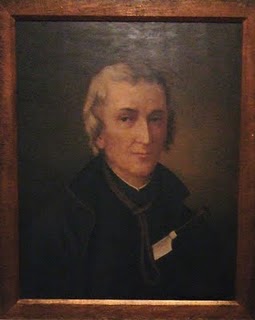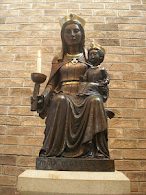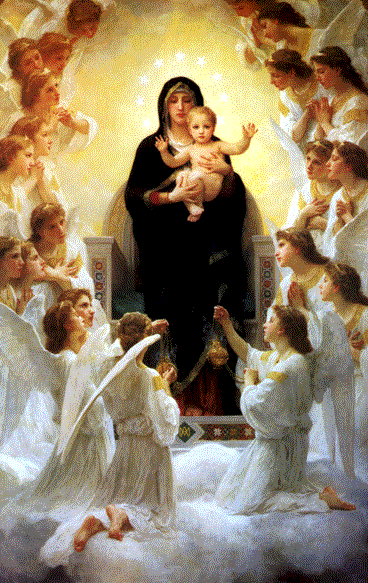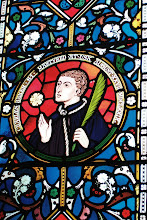ST PHILIP EVANS S J
 Philip Evans was born at Monmouthshire in 1645. He was the son of Winifred Morgan of Llanvihangel Crucorney and William Morgan of Llangattock Vibon Avel. Philip was educated at St Omer in Flanders and, on the 7th September 1665, he entered the Jesuit Novitiate at Watten. Ordained at Liege in 1675, Fr Philip Evans S J was sent on the English Mission to work among the Catholics of his native Wales. He was a diligent and tireless worker, preaching in both Welsh and English, administering the Sacraments and celebrating Mass.
Philip Evans was born at Monmouthshire in 1645. He was the son of Winifred Morgan of Llanvihangel Crucorney and William Morgan of Llangattock Vibon Avel. Philip was educated at St Omer in Flanders and, on the 7th September 1665, he entered the Jesuit Novitiate at Watten. Ordained at Liege in 1675, Fr Philip Evans S J was sent on the English Mission to work among the Catholics of his native Wales. He was a diligent and tireless worker, preaching in both Welsh and English, administering the Sacraments and celebrating Mass.It is known that the young Jesuit, along with Fr David Lewis, regularly stayed at the home of Thomas Gunter of Cross Street in Abergavenny. Here he celebrated Mass and tended to the needs of Catholics of the area. He also stayed at the homes of Charles Prodger of Wernddu and Christopher Turberville of Sker House and cared for Catholics in these locations.
As the sinister tendrils of the Oates Plot snaked across the country in the autumn and winter of 1678, friends advised Fr Evans to flee and to go into hiding. This he refused to do, preferring to continue with his work among the oppressed and abused Catholics. The Government offered a £50 reward for the apprehension of any priest or Jesuit. To this £50 reward a local magistrate and bitter anti-Catholic, John Arnold of Llanvihangel Court, added an extra incentive of £200. To be sure, there was no shortage of willing informers so time was running out for the courageous priest.
The arrest of Fr Philip Evans at Sker House of 4th December 1678 was brought about by the quisling, Edward Turberville. Edward Turberville was a lapsed Catholic and the younger brother of Christopher Turberville. Philip Evans was imprisoned in Cardiff Castle and spent several weeks in solitary confinement. Eventually he and Fr John Lloyd, a secular priest who had been arrested in November, shared a cell. In May 1679, Fr Evans was brought to trial at Cardiff Assizes. He was found guilty of being a Catholic priest and of saying Mass. This was, under the Penal Laws of the time, considered High Treason so Philip Evans was sentenced to be hanged, drawn and quartered, the usual sentence for treason.
The sentence was not immediately carried out and, strangely, Fr Evans was even allowed out of prison for recreation! On 21st July, the gaoler received orders that the priest was to be executed the next day. Fr Evans was playing tennis so the Gaoler went to return him to his cell and to tell him the sad news. Fr Evans was unperturbed and asked, “What haste is there? Let me first play out my game.”
When Philip was returned to prison, his legs were bound in chains. His spirit was unquenchable and, a skilled harpist, he took up his harp and played. The next morning when the authorities came to take him to the place of executio n, they were astounded to find Fr Evans joyfully playing the harp. The chains on the priest’s legs were so tight that it took over an hour to remove them. Their removal caused a great deal of pain to the prisoner. Finally he and Fr Lloyd, who was to die that day too, were taken to the place of execution, Gallows Field, outside Cardiff. When he mounted the gallows Fr Evans said, “This is the best pulpit a man can have to preach in, therefore, I cannot forbear to tell you again that I die for God and religion’s sake.” He addressed the crowd in English and Welsh, then turning to Fr Lloyd he said, “Adieu, Mr Lloyd! Though only for a little time, for we shall soon meet again”.
n, they were astounded to find Fr Evans joyfully playing the harp. The chains on the priest’s legs were so tight that it took over an hour to remove them. Their removal caused a great deal of pain to the prisoner. Finally he and Fr Lloyd, who was to die that day too, were taken to the place of execution, Gallows Field, outside Cardiff. When he mounted the gallows Fr Evans said, “This is the best pulpit a man can have to preach in, therefore, I cannot forbear to tell you again that I die for God and religion’s sake.” He addressed the crowd in English and Welsh, then turning to Fr Lloyd he said, “Adieu, Mr Lloyd! Though only for a little time, for we shall soon meet again”.
 n, they were astounded to find Fr Evans joyfully playing the harp. The chains on the priest’s legs were so tight that it took over an hour to remove them. Their removal caused a great deal of pain to the prisoner. Finally he and Fr Lloyd, who was to die that day too, were taken to the place of execution, Gallows Field, outside Cardiff. When he mounted the gallows Fr Evans said, “This is the best pulpit a man can have to preach in, therefore, I cannot forbear to tell you again that I die for God and religion’s sake.” He addressed the crowd in English and Welsh, then turning to Fr Lloyd he said, “Adieu, Mr Lloyd! Though only for a little time, for we shall soon meet again”.
n, they were astounded to find Fr Evans joyfully playing the harp. The chains on the priest’s legs were so tight that it took over an hour to remove them. Their removal caused a great deal of pain to the prisoner. Finally he and Fr Lloyd, who was to die that day too, were taken to the place of execution, Gallows Field, outside Cardiff. When he mounted the gallows Fr Evans said, “This is the best pulpit a man can have to preach in, therefore, I cannot forbear to tell you again that I die for God and religion’s sake.” He addressed the crowd in English and Welsh, then turning to Fr Lloyd he said, “Adieu, Mr Lloyd! Though only for a little time, for we shall soon meet again”.Thirty-four year old Fr Philip Evans, joyful to the last, was martyred at Gallows Field, Cardiff (the northern end of Richmond Road) on 22nd July 1679. He was the seventh Jesuit to be executed due to the evil scheming of Titus Oates and his lying henchmen. On 15th December 1929 Pope Pius XI beatified Philip Evans. On 25th October 1970 this Welsh martyr was canonised by Pope Paul VI as one of the Forty Martyrs of England and Wales.
LINKS TO THIS POST: The Perjurer Titus Oates and Eight Jesuits (Part 1),








.JPG)

.JPG)






Really Enjoy your site, i always learn so much.
ReplyDeleteThank you,
g
Excellent thread, I've learnt a great deal about St Philip Evans and his fellow martyrs!
ReplyDeleteGood Morning g
ReplyDeleteIt's good to hear from you. I appreciate your visit and your kind comment.
I just want to spread the word on these very worthy martyrs. They were such strong characters with deep faith and loyalty. Great role models for all of us!
God bless you and yours.
Good morning Richard
ReplyDeleteNice to hear from you.
When I began this blog I knew a little about St David Lewis, St Philip Evans, St John Lloyd and St John Kemble - but just a little! I have learned a lot more about them and about the others martyrs too. I am happy about that because they were such amazing people it is a great privilege to get acquainted with them. I think that some of them are almost unknown and certainly undervalued. That's why I want to tell as much as I can about them. I have a lot more to learn about all of them but I will keep digging and posting.
Thanks Richard and God bless you.
I'm so very sorry. I'm certain I left a message in an earlier post that I'd received - and appreciate - the booklet you sent. I'm not sure what happened - whether it got lost in cyberspace or whether I forgot to hit Post Comment or what. Please accept my heartfelt apologies and thanks!
ReplyDeleteSue
Hi Sue
ReplyDeleteNo problem! I am just glad that you received the booklet. I understand about the disappearing comment because I frequently watch my e-mails just fade away and comments that I am sure I posted never show up. I don't know if it is me (I think it is but hate to admit it) or my computer but things sometimes go really rather strange.
Anyway, Sue, thanks for letting me know so promptly. I hope to have another little giveaway after Christmas so keep watching. Thanks Sue and God bless you.